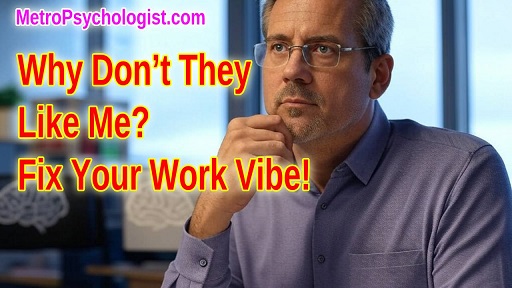
Why Your Coworkers Might Not Like You At Your Workplace
Welcome to MetroPsychologist.com! I’m thrilled you’re here, exploring insights to navigate the complexities of life, love, and work. Whether you’re seeking relationship advice, tips for better work-life balance, or strategies to thrive in your career, you’ve landed in the right place. Today, we’re diving into a topic that hits close to home for many: why your coworkers might not like you at your workplace. It’s a question that can stir up self-doubt, but understanding the reasons behind it can empower you to build stronger connections and a more harmonious work environment. Let’s unpack this with an open mind and a practical lens, drawing from organizational psychology and real-world dynamics. And if you enjoy this deep dive, don’t forget to check out my YouTube channel, MetroPsychologist, for more videos on work-life balance, couples counseling, and personal growth!
Workplaces are like ecosystems—everyone plays a role, and the balance depends on how well we coexist. But sometimes, despite your best intentions, you might sense a chill from your coworkers. Maybe they’re less chatty around you, exclude you from lunch plans, or seem to avoid collaborating. It’s easy to take it personally, but the reasons often tie back to subtle behaviors, perceptions, or mismatches in communication styles. Let’s explore some common culprits and how you can turn things around.
First up, communication—or the lack thereof—can be a big player. Are you someone who dominates conversations, cutting others off to share your ideas? Or maybe you’re the opposite, staying silent in meetings and leaving coworkers guessing about your thoughts? Both extremes can rub people the wrong way. Over-talkers might come off as arrogant or dismissive, while the quiet ones can seem aloof or uninterested. People crave balance in interactions—a give-and-take where they feel heard and valued. If your style leans too far one way, it might unintentionally signal that you don’t respect their input. Try observing how you engage: ask questions, listen actively, and share thoughtfully. Small tweaks can shift how you’re perceived.
Next, let’s talk about attitude. Positivity is contagious, but so is negativity. If you’re the coworker who grumbles about every task, criticizes management nonstop, or shrugs off team wins with a “whatever,” it’s no surprise others might keep their distance. Chronic negativity drains energy, and people naturally gravitate toward those who lift the vibe, not sink it. On the flip side, being overly chipper in a high-stress environment can feel out of touch—like you’re ignoring the reality everyone else is grappling with. The key is emotional intelligence: read the room, match the tone when needed, and offer solutions instead of just complaints. A balanced attitude shows you’re in it with the team, not against it.
Another factor could be your work style. Are you the perfectionist who nitpicks every detail, slowing down group projects? Or maybe you’re the laid-back type who misses deadlines, leaving others to pick up the slack? Both can breed resentment. Perfectionists might come across as controlling, while slackers signal unreliability. Coworkers want someone they can count on—someone who pulls their weight without making life harder. Reflect on how your habits impact the team. If you’re overbearing, ease up and trust others’ contributions. If you’re too casual, step up your game. Alignment with the group’s rhythm builds trust and goodwill.
Then there’s the social piece. Work isn’t just about tasks; it’s about relationships. If you skip the watercooler chats, dodge team outings, or keep your personal side under lock and key, you might seem distant. People bond over shared moments—whether it’s a laugh about a quirky client or a quick vent about a tough day. Opting out can make you an outsider, not because they dislike you, but because they don’t know you. You don’t have to be everyone’s best friend, but showing up for the small stuff—like asking how their weekend went—can warm things up. On the flip side, oversharing or gossiping can backfire, making you the coworker others avoid to dodge drama. Strike a friendly, professional middle ground.
Sometimes, it’s not even about you—it’s about perception. Maybe you got a promotion they wanted, or you’re tight with the boss, stirring up envy or mistrust. These dynamics are trickier because they’re out of your direct control. But you can still soften the edges. Be transparent about your work, give credit where it’s due, and avoid flaunting perks. Humility goes a long way in smoothing over unspoken tensions. People might not admit it, but they’re watching how you handle success or setbacks, and fairness earns respect.
Finally, consider the mirror effect: are you projecting your own insecurities? If you feel disliked, you might pull back or get defensive, which only widens the gap. Organizational psychology tells us that self-fulfilling prophecies are real—if you assume they don’t like you, your vibe might push them away. Flip the script: approach them with curiosity and openness. A simple “Hey, how’s your day going?” can break the ice and shift the narrative.
So, what’s the takeaway? If your coworkers don’t seem to vibe with you, it’s rarely a personal attack—it’s usually a signal to tweak your approach. Communication, attitude, work style, social engagement, and perception all play a part. Start small: listen more, complain less, show up consistently, and let your guard down just enough to connect. You don’t need to overhaul who you are—just refine how you show up. Workplaces thrive on collaboration, and a little self-awareness can turn frosty vibes into warm ones.
Loved this dive into workplace dynamics? There’s plenty more where that came from! Head over to my YouTube channel, MetroPsychologist, where I unpack topics like this—think relationship advice, dating tips, couples counseling, and tricks for mastering work-life balance. Hit subscribe, drop a comment, and let’s keep the conversation going. Together, we’ll navigate the messy, beautiful world of human connections—one insight at a time!
